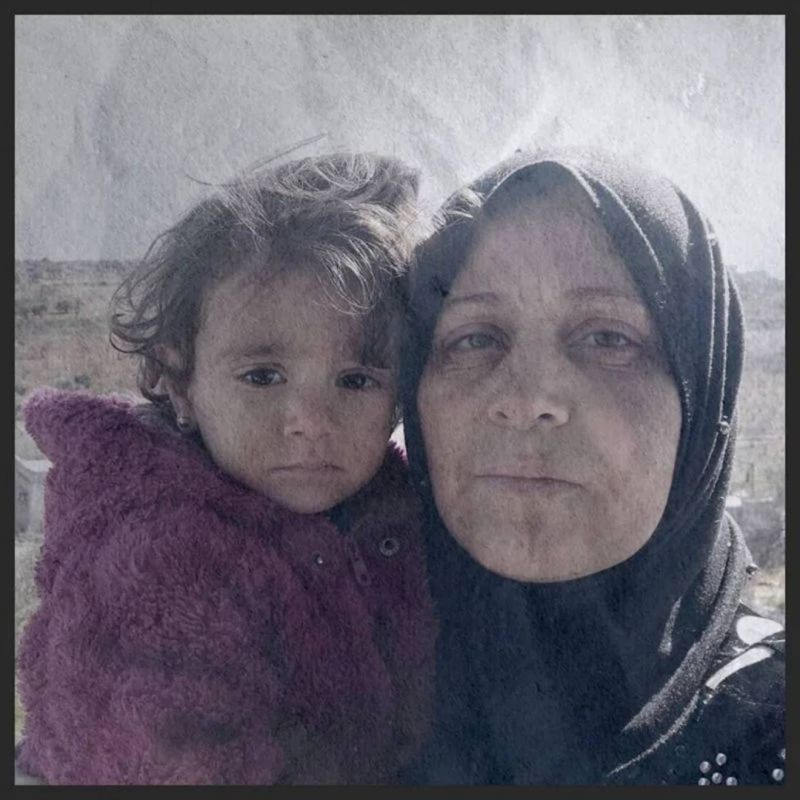
Dalal, an employee of the Zamarrod Center for Women’s Empowerment, and her daughter Dahab, in Idlib province, the last stronghold of the Syrian opposition to the Assad regime. (Credit: Courtesy of Dalal)
It seemed like yet another curse among many.
After more than a decade of bombing by Bashar al-Assad's regime and its Russian ally, the seizure of much of the area by the jihadist group Hay’at Tahrir al-Sham (HTS), as well as economic and humanitarian crises, Syria’s rebel-held northwest was hit yet again — this time by the earthquake at dawn on Feb. 6.
In areas of northwestern Syria controlled by HTS or Ankara-backed rebels, at nearly 3,700 people have died, based on a preliminary death toll on 17 February.
Left to their own devices, the White Helmets, a local civil defense group, are still trying to free survivors from the rubble. Meanwhile, residents have been held hostage for several years by the Syrian state and Russia’s partial blockade of humanitarian convoys into the area.
This week, L’Orient Today will give the floor to residents of opposition-held northwestern Syria, where 4 million people live, most of them internally displaced by 12 years of conflict.
Today, the testimony of Dalal, an employee of the Zamarrod Center, which works on capacity building among women in the town of Salqin, Idlib province.
Testimony collected by Emmanuel HADDAD.
“I woke up early [Thursday], still in shock at being back in our small flat in Jabal Zawiya, a village in the hinterland of Ariha, in central Idlib, which we had left four years earlier to flee the bombing by Bashar al-Assad’s regime. I turned on the oil heater and pulled my three daughters, Dahab, Nour and Labnoua, closer together to keep them warm. The first thing that came to my mind was ‘Thank God, my seven children, my husband, his mother and my son’s family are all safe around me.’
“I thought of my cousin’s friend, who died under the rubble with his three daughters. One of my colleagues at the Zamarrod Center lost her husband and children in the earthquake. Like me, she had moved to Salqin, ... on the border with Turkey, to escape the regime’s bombing, but it was ultimately the earthquake that destroyed her family. In this misfortune, mine was lucky. In the building in Salqin where we had been living for four years, the floors above and below ours collapsed. We managed to escape without too much trouble.
“I then went downstairs to get water to make tea and prepared food for us. After the earthquake, my children all got sick because we had to wait for hours in the rain and cold. When we fled four years ago, we had left behind some provisions and fuel, so we can make it through today. As the day wore on, [the health of] my daughter Dahab, one year and seven months old, worsened and I started to panic. There is no hospital here, but I decided to take her to a doctor at a health center a few kilometers away. He examined her, gave her some medicine and we went home for me to look after her.
“I was able to put on a few extra layers of clothing, which will help her heal. Four days ago I went back to our flat in Salqin to collect the children’s clothes, as we had fled the earthquake empty-handed and they had nothing to wear.
“There, I took the opportunity to take clothes made in the sewing workshop organized by the women’s center where I work. I went to distribute them in the surrounding IDP camps, and I could see how people lack everything. Those who are lucky enough to have a tent are jammed inside, with nothing to keep them warm. I saw only one humanitarian organization. It only had bread to distribute. Unfortunately, the Zamarrod Center does not have the means to help. Some of our 22 members stayed in Salqin in tents, but others had to relocate again, in hopes that they will be able to find accommodation in Salqin when the aftershocks end.
“In the evening, after putting my children to bed and keeping Dahab up to make sure her fever subsided, I thought about our flat in Salqin, which we had struggled in hardship for four years to furnish. I hope that when the aftershocks are over, we will be able to move back in, but I’m afraid the damage from the earthquake will make it uninhabitable.”